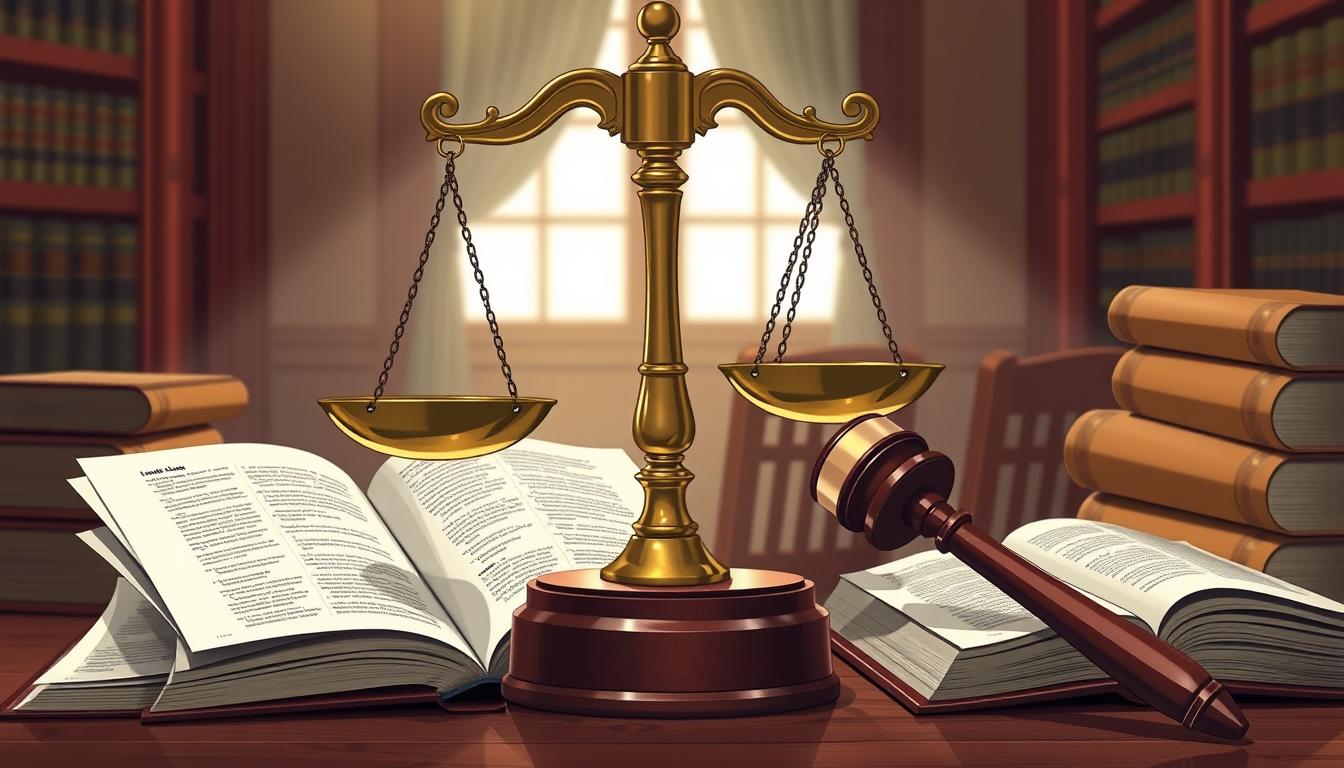Ethical Decision-Making in Legal Practice
Legal professionals often face tough ethical choices. These tests our moral thinking and our dedication to the legal field’s highest standards. But what does it mean to make ethical choices in the fast-paced legal world? How do we deal with the complex duties, obligations, and conflicting interests in our work?
We’ll dive into the core of legal ethics, look at moral reasoning, and explore different ways to make ethical decisions. We’ll cover everything from keeping client secrets to handling conflicts of interest. Our goal is to give you the tools and strategies to navigate these challenges and stand out as a beacon of integrity in the legal world.
Let’s start a journey to grasp the true meaning of ethical practice. We’ll learn how to make decisions that help our clients and improve the legal profession as a whole.
Fundamentals of Legal Ethics
The legal world is built on strong ethical rules and duties. These rules help lawyers keep the legal system fair and serve their clients well. They also make sure the courts and society benefit.
At the heart of legal ethics are key values. These include keeping public trust, ensuring justice is fair, and doing right by clients, courts, and the community.
Defining Professional Responsibility
Legal ethics set clear rules for lawyers in many areas. The Model Rules of Professional Conduct by the American Bar Association (ABA) guide most US states. These rules cover important topics like keeping client secrets, avoiding conflicts, and being honest with the court and others.
Core Ethical Principles in Law
- Competence and diligence in legal representation
- Loyalty and confidentiality in the attorney-client relationship
- Candor and integrity in dealings with the court and opposing counsel
- Independence of professional judgment
- Promoting access to justice and the public good
The Role of Moral Reasoning
Legal ethics are based on rules, but lawyers also face broader moral issues. Making ethical choices often means solving tough problems and using moral thinking. This requires careful thought, seeking advice, and knowing the legal system’s values and duties.
| Key Ethical Principles | Description |
|---|---|
| Competence and Diligence | Lawyers must have the right skills and effort to help their clients. |
| Loyalty and Confidentiality | Lawyers owe a duty to their clients, keeping their secrets safe. |
| Candor and Integrity | Lawyers must be honest and open with the court, opposing counsel, and the public. |
| Independence of Judgment | Lawyers should make decisions on their own, without outside pressure or conflicts. |
| Promoting Access to Justice | Lawyers should help make sure justice is fair for everyone and legal help is available to all. |
“The legal profession has a responsibility to promote the rule of law and to ensure that our system of justice is accessible to all. Ethical conduct is the foundation upon which this responsibility rests.”
The Importance of Client Confidentiality and Attorney-Client Privilege
In the legal world, client confidentiality and attorney-client privilege are key. Lawyers must keep client info safe, like talks, papers, and secret data. This builds trust and lets clients talk freely without worry.
The attorney-client privilege is vital for keeping legal talks private. It stops lawyers and clients from being forced to share their talks in court. This protects their privacy and keeps the legal system fair.
Keeping client confidentiality is not just right; it’s smart for business too. Happy clients tell others about their lawyers and come back for more. This shows how keeping secrets is key to a lawyer’s success.
But, keeping secrets can be hard, especially when it might hurt someone or stop justice. Lawyers must think carefully and do the right thing. This is part of their ethical obligations.
“The attorney-client privilege is the oldest of the privileges for confidential communications known to the common law.” – Upjohn Co. v. United States, 449 U.S. 383 (1981)
Good client confidentiality means training staff, keeping data safe, and knowing what to do if there’s a leak. As laws change, lawyers must stay up to date and keep their ethical obligations strong.
Understanding Conflicts of Interest in Legal Practice
As legal professionals, we must always put our clients first. Conflicts of interest happen when our personal or financial interests clash with our duty to our clients. These situations require careful handling to keep our client representation strong and our ethical decision-making intact.
Types of Conflicts
There are different kinds of conflicts. Concurrent conflicts happen when we represent clients with opposing interests. Successive conflicts occur when a current case conflicts with a past or ongoing one. Personal conflicts arise when our own interests or relationships affect our ability to represent clients fairly.
Prevention and Management Strategies
To avoid conflicts of interest, we must be proactive. This includes telling clients about potential issues, getting their consent, setting up ethical walls in our firm, and sometimes, withdrawing from a case.
Documentation and Disclosure Requirements
Being transparent is key when dealing with conflicts of interest. We must document any potential conflicts, tell affected clients, and get their written consent before we can represent them. Not doing this can lead to serious ethical and legal problems.
“90% of conflicts issues facing lawyers in private practice can be avoided by following three simple rules.”
By understanding conflicts of interest, we can handle these challenges with integrity. This way, we protect the trust our clients have in us and uphold the highest standards of ethical decision-making.
Ethical Decision-Making in Legal Practice
Lawyers face many ethical challenges. They need to be sensitive to these issues and have a clear way to think about them. Making ethical decisions in law means looking at all sides of a problem.
Having a strong ethical framework helps lawyers deal with tough choices. They often talk with colleagues to get different views. This helps when they face new or hard ethical problems.
Lawyers must use ethical frameworks, moral reasoning, and professional judgment to keep the law’s integrity. This ensures their actions protect their clients’ rights and interests.
“The practice of law is a noble calling, one that carries with it a responsibility to act with the highest levels of ethics and integrity.”
Lawyers must balance being a strong advocate, telling the truth, and keeping client secrets. They face dilemmas like managing conflicts of interest and upholding standards. They must keep their clients’ trust.
Ethical Frameworks and Moral Reasoning
Ethical frameworks help lawyers solve moral problems and make decisions. They use theories like utilitarianism, deontology, and virtue ethics. This helps them think about the rightness of their actions.
- Utilitarian approach: Looking at the good and bad of a decision’s outcomes.
- Deontological approach: Focusing on the rightness or wrongness of an action itself.
- Virtue ethics: Emphasizing the importance of being honest, fair, and having integrity.
Through moral reasoning, lawyers can deeply consider ethical issues. They look at different views and make choices that show their professional judgment.
| Ethical Consideration | Potential Dilemma | Guiding Principles |
|---|---|---|
| Client Confidentiality | Balancing confidentiality with the need to prevent harm or report illegal activities | Duty of loyalty, respect for client autonomy, harm prevention |
| Conflicts of Interest | Maintaining impartiality and loyalty when representing multiple clients with competing interests | Duty of undivided loyalty, independent professional judgment, informed consent |
| Zealous Advocacy | Upholding the client’s interests while adhering to ethical obligations and truthfulness | Duty of competence, diligence, and candor, respect for the legal system |
By carefully considering these ethical issues, lawyers can improve their professional judgment. This helps them keep the legal profession’s integrity.
Maintaining Professional Integrity and Moral Character
In the legal world, being honest and true is key. Lawyers must be genuine and honest in their work. This means being honest, clear with clients, and making fair decisions.
Lawyers must follow rules, keep learning, and think about their actions. This helps them earn trust and improve the legal field. By being honest and fair, lawyers can make a positive difference.
Building Trust with Clients
Trust is vital in the lawyer-client relationship. Lawyers must be loyal and put clients first. Keeping client secrets is also crucial.
By focusing on the client’s needs and being open, lawyers build trust. This creates a respectful and honest relationship.
Upholding Professional Standards
Lawyers must follow strict rules to keep their reputation high. This means staying updated on laws and thinking about their actions. Lawyers who follow these standards help keep the legal system strong.
Developing Ethical Awareness
Being aware of ethics is important for lawyers. It means spotting ethical problems and making fair choices. This helps lawyers stay true to their values and earn respect.
“Integrity is the essence of everything successful.” – R. Buckminster Fuller
Being honest in law can bring many rewards. It leads to personal growth, success, and a better reputation. Key to this is being mindful, accountable, and truthful.
Navigating Complex Ethical Dilemmas
In the legal world, ethical challenges are common. Lawyers often face tough dilemmas that need careful thought and strong moral reasoning. Issues like conflicts of interest and confidentiality breaches make the legal field delicate and complex.
Studies show that 85% of legal professionals deal with ethical dilemmas in their careers. They struggle with balancing being a zealous advocate and being honest in court. They also face challenges like managing personal relationships with clients and dealing with conflicting loyalties. In fact, 67% of attorneys report facing conflicts of interest, making ethical decisions hard.
To tackle these issues, lawyers use various ethical decision-making frameworks. The RIGHT Decision Method is one such tool. It involves recognizing the dilemma, identifying viewpoints, gathering resources, having a plan, and taking action based on ethics. This method, along with other ethical theories, helps lawyers make tough decisions while staying true to their professional responsibility and moral reasoning.
| Ethical Challenge | Percentage of Attorneys Affected | Approach to Resolution |
|---|---|---|
| Conflicts of Loyalty | 67% |
|
| Confidentiality vs. Public Interest | 23% |
|
| Conflicts of Interest |
|
Utilize ethical frameworks and decision-making methods |
By using ethical decision-making frameworks and ongoing moral reasoning, legal professionals can handle the tough ethical challenges in their field. They can maintain the highest standards of professional responsibility.
Balancing Advocacy and Ethics
In the legal world, finding a balance between strong advocacy and ethics is key. Lawyers must fight for their clients while staying honest and fair. This balance is hard to keep but is crucial for the legal system’s trust.
Zealous Representation vs. Ethical Obligations
Zealous advocacy means lawyers should fight hard for their clients. But, they must do so within ethical limits. They must know when to stop to keep the law’s integrity.
Dealing with Difficult Clients
Handling tough clients is a big challenge. Lawyers need to communicate clearly and stand firm on ethics. They should never agree to unethical actions, even if it means losing the client.
Managing Competing Interests
Lawyers often face conflicts between their work and personal lives. They must identify and manage these conflicts to stay ethical. Good client management helps them handle these situations well.
Lawyers must always put justice and fairness first. By focusing on ethics and improving their skills, they can balance advocacy and duty. This keeps the legal system respected and trusted.
“The true lawyer is a person who can see the moral side of things and who tries to shape his or her clients’ conduct, not only to meet the letter of the law, but also to respond to the higher ethic of justice.”
The Role of Professional Codes and Guidelines
Professional codes and guidelines are key in shaping ethical behavior in law. The American Bar Association’s (ABA) Model Rules of Professional Conduct is a major example. It helps lawyers make ethical decisions by covering topics like client privacy and avoiding conflicts of interest.
The ABA Model Rules were first introduced in 1983 and have been updated many times. Most states have adopted these rules. They outline what lawyers must do, like keeping client secrets and avoiding conflicts. Not following these rules can lead to serious problems, like legal malpractice claims.
State bar associations and other legal groups also set guidelines. These guidelines give detailed advice on handling tricky ethical situations. They help lawyers understand how to act in different scenarios.
The legal field is built on laws, rules, and moral values. Keeping these values is vital for trust and the rule of law. Clients want lawyers they can trust. By following professional codes, lawyers can build strong relationships and keep the legal system honest.
“A strong ethical foundation is essential for upholding the rule of law and maintaining public trust in the legal profession.”
The Role of Ethics Education
Ethics education in law schools is crucial. It helps build a strong ethical base in the legal world. Continuing legal education keeps practicing lawyers up to date on ethics and laws. This education teaches lawyers how to handle the challenges of legal work.
| Key Ethical Principles | Description |
|---|---|
| Autonomy | Respecting the right of individuals to make their own decisions |
| Justice | Treating equals equally and unequals unequally in proportion to their relevant differences |
| Beneficence | Contributing to the welfare of the client |
| Nonmaleficence | Avoiding harm to others, considered the most critical principle |
| Fidelity | Maintaining loyalty, faithfulness, and honoring commitments |
Conclusion
Ethical decision-making is key in legal practice. It needs a deep understanding of ethics and professional codes. Lawyers must balance their duties to clients, the court, and society while staying true to themselves.
They need to keep learning, reflect on themselves, and talk openly with others in the legal field. This helps them keep high ethical standards.
The legal field must focus on making ethical decisions to build trust and integrity. Using ethical frameworks helps legal professionals deal with complex challenges. This ensures their work meets the highest moral and professional standards.
As technology and society change, ethical decision-making becomes even more important. Legal practices that focus on ethics will adapt well. They will build strong client relationships and keep a good reputation in the legal community.
Source Links
- 6. Ethical and Legal Practice
- A Framework for Ethical Decision Making
- 5 Most Common Ethical Dilemmas in Legal Practice and How to Handle Them
- legal ethics
- Legal ethics | Professional Responsibility & Moral Obligations | Britannica
- Legal Ethics in the Legal Profession | Intro to Law and Legal Process Class Notes
- The Importance of Client Confidentiality in Legal Practice
- The Importance of Confidentiality in Legal Practice – Lawyer Monthly
- Identifying and Resolving Conflicts of Interest: Three Simple Rules
- conflict of interest
- LAWYERS IN PRACTICE: ETHICAL DECISION MAKING IN CONTEXT
- 5. Ethical and Legal Practice
- Ethical Dilemmas in the Legal Profession: A Critical Examination for Aspiring Lawyers
- The Authentic Lawyer: Ethics, Integrity, and Professionalism
- THE IMPORTANCE OF INTEGRITY IN THE LEGAL PROFESSION
- Frontline Initiative
- Navigating Ethical Dilemmas: A Guide to Ethical Decision Making Frameworks
- Balancing Advocacy and Integrity – Legal Lens
- The Ethics of Narrative Manipulation in Legal Practice: Balancing Advocacy and Integrity
- Legal Ethics: Challenges and Solutions – Ambedkar Group of Institution
- Practioner’s Guide to Ethical Decision Making
- Ethics and Professional Responsibility in Law: Building a Strong Foundation
- Rules of Professional Conduct for Lawyers
- Ethical Decision Making: Navigating Tough Choices with Confidence
- Ethical Choices in Legal Practice







